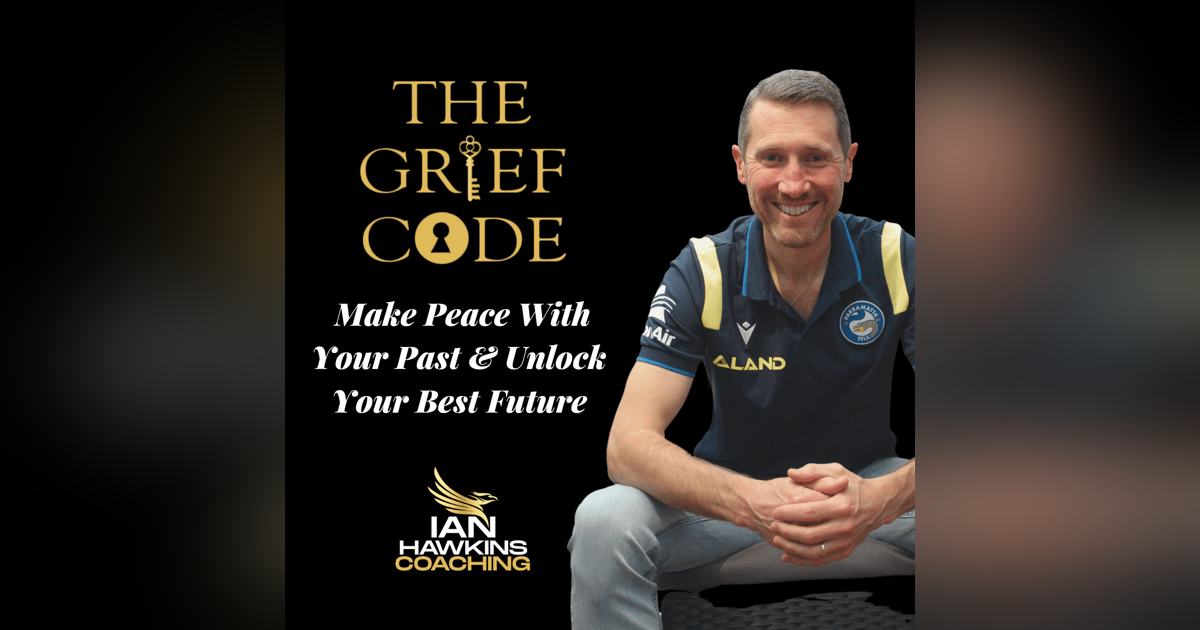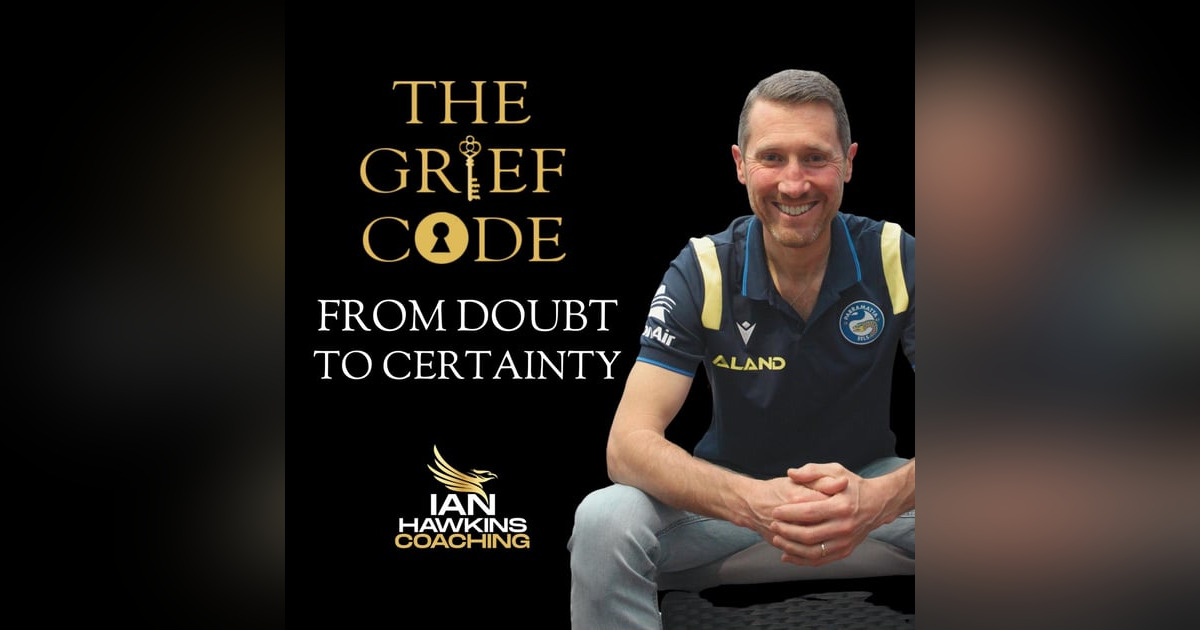
Sign up to get updates from us
By signing up, you agree to receive email from this podcast.

Episode Summary
In this episode, Ian stresses the importance of everyday routine in maintaining order.
Heal your unresolved and unknown grief: https://www.ianhawkinscoaching.com/thegriefcode
About the Host:
Ian Hawkins is the Founder and Host of The Grief Code. Dealing with grief firsthand with the passing of his father back in 2005 planted the seed in Ian to discover what personal freedom and legacy truly are. This experience was the start of his journey to healing the unresolved and unknown grief that was negatively impacting every area of his life. Leaning into his own intuition led him to leave corporate and follow his purpose of creating connections for himself and others.
The Grief Code is a divinely guided process that enables every living person to uncover their unresolved and unknown grief and dramatically change their lives and the lives of those they love. Thousands of people have now moved from loss to light following this exact process.
Check Me Out On:
Join The Grief Code Facebook group: https://www.facebook.com/groups/1184680498220541/
Facebook: https://www.facebook.com/ianhawkinscoaching/
Instagram: https://www.instagram.com/ianhawkinscoaching/
LinkedIn: https://www.linkedin.com/in/ianhawkinscoaching/
Start your healing journey with my FREE Start Program https://www.ianhawkinscoaching.com/thestartprogram
I hope you enjoyed this episode of The Grief Coach podcast, thank you so much for listening.
Please share it with a friend or family member that you know would benefit from hearing it too.
If you are truly ready to heal your unresolved or unknown grief, let's chat. Email me at info@ianhawkinscoaching.com.
You can also stay connected with me by joining The Grief Code community at www.ianhawkinscoaching.com/thegriefcode and remember, so that I can help even more people to heal, please subscribe and leave a review on your favourite podcast platform.
Ian Hawkins 0:02
Are you ready, ready to release internal pain to find confidence, clarity and direction for your future, to live a life of meaning, fulfillment and contribution to trust your intuition again, but something's been holding you back, you've come to the right place. Welcome. I'm a Ian Hawkins, the host and founder of The Grief Code podcast. Together, let's heal your unresolved or unknown grief by unlocking your grief code. As you tune into each episode, you will receive insight into your own grief, how to eliminate it, and what to do next. Before we start by one request, if any new insights or awareness land with you, during this episode, please send me an email at info at the Ian Hawkins coaching.com. And let me know what you found. I know the power of this word, I love to hear the impact these conversations have, okay, let's get into it.
Have you experienced where your partner suddenly has this realization around something and they come home or they just come into you and they're all excited about something they've learned and then they're gonna implement it in your hand, you're like I said that to you 10 years ago. Or, conversely, the other way around where you've heard something. And it's like part of you maybe even knows that they, your partner suggested it, or you've forgotten, or you deny it, and lie. And I told you that ages ago. It's amazing how there is a partner or a sibling or a close friend, how we just don't like to hear advice from those people close to us. We have a desire to learn these things for ourselves. And there's also something around control and power and all those sorts of things where it's like, oh, we don't know, maybe they will ride. This crazy thought that there might be giving up some power.
I remember one for me was really simple one and making the bed otherwise, like why on earth we made the bed remaining. And I'll pull it all apart in my spot started learning from from one of my first online mentors, Jim Rohn. And he talked about daily disciplines, and how it should start from the moment you get out of bed and make your bed because of the daily discipline to do things and keep things in order. Because of the sort of person that you will become by performing these daily disciplines, and how that led to the next discipline for the day and the next discipline, and how important having these things in place where and I mean to say that my wife and I knew what a reaction would be. But he was right. And so wishy, for different reasons. But yeah, we will still joke about it today. And there's countless moments like that, where each of us has realized something and learned something and the other partner hasn't necessarily taken it on board or dismissed it or whatever I now need to find out later. It's important to have humor around these different things. But it's why it's important to have an independent sounding board in your life. I remember dealing with the mate of mine who'd had to help his friend search for his his brother, who was not in a good place mentally, and I'm looking to take his own life. And unfortunately, he did. And I knew my mate would be taking a big load on board for caring for everyone and not not looking after himself. Because he's just that that sort of person, right? He's a caring person, and he looks after people. So I just made sure I called him and I just said to him, Look, that doesn't have to be me. But make sure you find someone who's not attached to the situation who you feel comfortable with who you trust, you can open up to and get this head of the head. And he did. And he said that was really beneficial. And I'm glad he did. Because he would have been holding on to a lot of stuff. Now whether it's working through some some pretty heavy stuff like that, or it's just wanting to improve your life. It's just such a benefit from having that independent sounding board, someone to bounce ideas off. Whether it's a mentor in your workplace, whether it's someone that you connect with is not necessarily a friend that you've spent A lot of time with who sort of, you know, in your entertainment circle, but but someone who's more someone you connect with for more positive sort of stuff, someone just to bounce ideas off. But even sometimes those people can become quite close. And then maybe we don't fully, fully feel like opening up to them. So again, just just having that space to talk and to open up is such an important part. Such an important part. Actually, I wasn't in my mind to mention this today, but I will always is that my trainings this year. I've been, I think I've mentioned it in previous episodes that I've been getting really clear on what they would look like. And the free training that I do, which which I've modified and will be free again, important part that I realized is people need to have that opportunity to, to externalize things. And in the past with those in the training, I've done it, where they've done it through writing or through meditation, but now it's going to be interactive, we're actually going to give people opportunity to talk to him because I know how important that is. So they can externalize it and get that bouncing ideas back off. Someone who not only does this for the job, but I really love it, I enjoy it. And I'm good at it. And I wouldn't have been able to say that about anything really, I would have downplay things because my own lack of self belief and the stigma around being able to own what you're good at. But that's just an outdated model of living. If you're good at something, you're gonna own it. So listen to a podcast this week. Barry Hearn he's owns matchroom was one of the production companies in the UK that we actually worked closely with. He's on the High Performance podcast, and he was talking about if you're in business, and you're good at something, shout it from the rooftops. Because there's no point being really good if no one knows about it. And even if you're not in business, just in any area, be okay to to let people know that in that area you are you actually got some talent. And if people are not going to take that, well, well, then maybe there's no sort of way we WANT YOUR life anyway. I'm gonna be off track here, but comes back to that having that sounding board. So this will change your life. For the better having that independent sounding boards to be able to externalize give that head and have that clarity of thought by doing so. Particularly for any external processor like me. I got my daughter's like that. So we often just have conversations around that were just not even a response. Just someone that listen, we externalize it. Sometimes I talk a bit of crazy talk, and they're like, What are you talking about, but I'm just getting things out of my head. I'm processing it out loud. It's a really powerful, powerful thing. I'm starting to externally process out loud through this podcast. I'll cut it off there. Enjoy the rest of your day and I'll speak to you next episode.
I hope you enjoyed this episode of The Grief Code podcast. Thank you so much for listening. Please share it with a friend or family member that you know would benefit from hearing it too. If you are truly ready to heal your unresolved or unknown grief. Let's chat. Email me at info at Ian Hawkins coaching.com You can also stay connected with me by joining the Grief Code community at Ian Hawkins coaching.com forward slash The Grief Code and remember, so that I can help even more people to heal. Please subscribe and leave a review on your favorite podcast platform